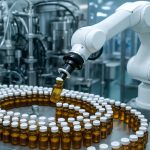Global Space Launch Update: Key Players, Innovations & Market Dynamics
Comprehensive Analysis of the Global Space Launch Sector: Leading Companies, Emerging Technologies, and Market ShiftsCurrent State of the Global Space Launch MarketEmerging Technologies and Innovations in Space LaunchKey Players and…
Fiber-Optic Drone Advancements and Strategic Influence in Ukraine
Transforming Aerial Intelligence: The Rise and Impact of Fiber-Optic Drones Across UkraineMarket OverviewEmerging Technology TrendsCompetitive Landscape AnalysisGrowth Projections and ForecastsRegional Deployment and InsightsFuture Outlook and Innovation PathwaysKey Challenges and Emerging…
Pharmaceutical Supply Chain Automation Market 2025: AI-Driven Efficiency to Fuel 12% CAGR Through 2030
Pharmaceutical Supply Chain Automation in 2025: Transforming Efficiency and Compliance. Explore Key Trends, Market Growth, and Strategic Opportunities Shaping the Next Five Years. Executive Summary & Market Overview Key Technology…
Lunar Regolith Utilization Technologies Market 2025: 38% CAGR Driven by ISRU and Construction Innovations
Lunar Regolith Utilization Technologies Market Report 2025: In-Depth Analysis of ISRU, Construction, and Resource Extraction Trends. Explore Market Growth, Key Players, and Strategic Opportunities Shaping the Next 5 Years. Executive…
SparkCharge Lands $30.5M Funding: Mobile EV Charging to Disrupt North America’s Electric Vehicle Market
SparkCharge secures $30.5M to expand instant mobile EV charging across North America, fueling the future for electric fleets and clean energy.
Jupiter and Mercury to Dazzle Skywatchers Tonight: Catch the Rare Double Planet Show Before It Vanishes
Mercury and Jupiter delight stargazers with a rare close pass just after sunset—learn the best way to see this fleeting display tonight.
Rare Hour-Long Cosmic Window: Catch the Dumbbell Nebula Before Dawn Shuts the Show
This week offers a rare, dark sky hour to spot the Dumbbell Nebula. Discover when and how to catch this celestial wonder at its finest.
Stargazers Stunned by Dazzling Moon Near Spica: Here’s What to See in Tonight’s Sky
The waxing gibbous Moon shines brilliantly tonight, drifting just past Spica in Virgo—see what telescopes and naked eyes can spot!
Sydney’s Smart Cockatoos Go Viral for Mastering Public Drinking Fountains In Genius New Urban Trick
Sneaky, Thirsty, and Brilliant: Sydney’s Cockatoos Are Now Turning On Public Fountains for a Sip Sydney’s sulfur-crested cockatoos are taking the internet by storm as new research shows their astonishing…
Virgin Australia Set to Soar as Bain Capital Unveils $685M ASX IPO—What Investors Need to Know Now
Virgin Australia’s $2.3 Billion ASX Comeback: Bain, Qatar & New CEO Ignite a Stock Market Shakeup Virgin Australia prepares for major ASX relisting on June 24, 2025, aiming to raise…



